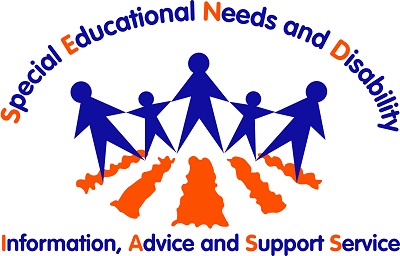Education Health and Care (EHC) Needs Assessment
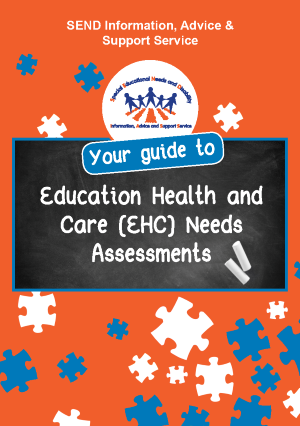
This page covers:
- What is an EHC Needs Assessment/When is an EHC needs assessment necessary?
- Making an EHC Needs Assessment Request
- What happens if the local authority decides that an EHC Needs Assessment is not necessary?
- What happens if the EHC Needs Assessment goes ahead?
- EHC Needs Assessment: What happens next?
- What if I do not agree with the Local Authority about the EHC Needs Assessment?
What is an EHC Needs Assessment
The EHC Needs Assessment is sometimes called ‘Statutory Assessment’ and concerns:
- Children in early years settings, for example nurseries
- Children of school age
- Young people (up to 25yrs) in Post-16 provision, for example colleges
An EHC needs assessment is an in depth assessment of a child or young person’s special educational needs (SEN) and the help and support he or she needs to learn and make progress. The Local Authority (Coventry City Council) is responsible for carrying out EHC needs assessments in Coventry under the Children and Families Act 2014 and Chapter 9 of the SEND Code of Practice 2015 sets out this process in full. It is available to download at www.gov.uk/government/publications/send-code-of-practice-0-to-25
The needs assessment is a detailed look at your child or young person’s difficulties and brings together information about:
- What your child or young person can or cannot do
- The special help and support he or she needs
The assessment will include information from:
- Parents/carers
- The child or young person
- The nursery, school or college your child attends
- Other professionals who work with and support your child
The assessment will determine if your child or young person needs an Education, Health and Care Plan (EHC plan).
When is an EHC needs assessment necessary?
The majority of children and young people with special educational needs will have their needs met at ‘SEN Support’ within a mainstream setting. This means that the nursery, school or college makes additional or different provision to meet their needs. This may include the involvement of other professionals and specialist support services, such as an Educational Psychologist or Sensory Support (see our guide on SEN Support for further information).
The SEND Code of Practice says:
In considering whether an EHC assessment is necessary, the local authority should consider whether there is evidence that despite the early years provider, school or post 16 institution having taken relevant and purposeful action to identify, assess and meet the special educational needs of the child or young person, the child or young person has not made expected progress (9.14).
Making an EHC Needs Assessment Request
The Local Authority has a duty to consider requests for an EHC needs assessment. In the majority of cases, the requests are made by the educational setting together with parents/carers and the young person, but requests can also be made by:
- Parents (for children under 16)
- Young people (between the ages of 16 and 25)
The SEND Code of Practice says:
The Local Authority must conduct an assessment of education, health and care needs when it considers that it may be necessary for special educational provision to be made for the child or young person in accordance with an EHC plan (9.3).
When considering a request for an EHC assessment the Local Authority will look at:
- The child or young person’s level of attainment and rate of progress
- The child or young person’s special educational needs
- The support that is in place and what has already been done to help
- The difference that the extra support has made
- The child or young person’s physical, emotional and social development and health needs
- Where the young person is over 18 whether he or she needs additional time to complete education or training
Coventry Local Authority has developed criteria as a guideline to help them decide when it is necessary to carry out an EHC assessment. You can find this criteria at: www.coventry.gov.uk/sendcriteria
The SEND Code of Practice says:
In considering whether an EHC needs assessment is necessary, local authorities should pay particular attention to the views, wishes and feelings of the child and his or her parent, or the young person (9.12).
The “Family conversation” is a tool used to gain the views of parents and carers as part of the EHC needs assessment process. It normally takes place prior to a request being made, normally alongside the educational setting. The information gathered during the family conversation should then be used across agencies so families need only tell their story once.
Once the local authority receives an EHC assessment request it has 6 weeks to notify parents, school and everyone involved of its decision.
Timeline: EHC Needs Assessment: weeks 0-6
- Request is made (by school, parent or young person)
- Notification of receipt by Local Authority
- Decision made within 6 weeks
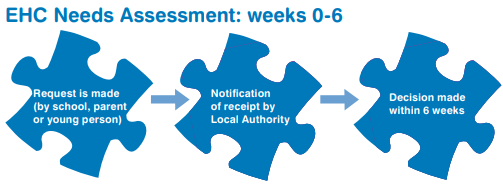
The local authority’s decision
What happens if the local authority decides that an EHC Needs Assessment is not necessary?
The local authority must tell you why it thinks that an EHC needs assessment is not needed. It must also tell you about:
- Your right of appeal
- Independent disagreement resolution and mediation
- How to get further advice and support
If you disagree with the local authority’s decision you can contact the EHC Plan Co-ordinator who will be named on the decision letter and/or the SEND Information, Advice and Support Service which will be able to discuss your options with you.
The SEND Code of Practice says:
“The Local Authority should also provide feedback collected during the process of considering whether an EHC needs assessment is necessary, including evidence from professionals, which the parent, young person, early years provider, school and post 16 institution may find useful” (9.19).
What happens if the EHC Needs Assessment goes ahead?
Once a decision to move ahead with the assessment is made, the local authority will ask for advice from relevant professionals about your child or young person’s education, health and care needs.
The local authority must ask for advice and information from:
- Parents/carers or the young person
- Your child or young person’s early years setting, school or college - If your child has a vision or hearing impairment, the local authority must also seek information and advice from a suitably qualified teacher
- Educational Psychologist
- Health professionals who work with your child or young person. This might include a pediatrician, speech and language therapist, physiotherapist or occupational therapist
- Social care
- Anyone else you ask them to contact who may be able to give relevant advice
Timeline: EHC Needs Assessment weeks 6-16
- Request for advice from professionals
- LA considers advice received
- LA decides whether to issue an EHC plan (within 16 weeks of original request)
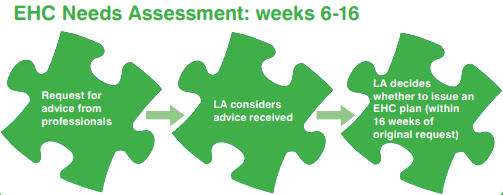
EHC Needs Assessment: What happens next?
The local authority will carefully consider all of the advice collected during the assessment and will decide whether an EHC Plan is necessary for your child or young person.
If the LA decides not to issue an EHC plan
If following the completion of an EHC needs assessment the local authority decides NOT to issue an EHC Plan it must notify you, the current educational setting and services involved and give reasons for the decision. This notification must take place as soon as practicable and at the latest within 16 weeks of the initial request.
If the local authority decides not to issue a draft EHC Plan it must tell you about:
- Your right of appeal
- Independent disagreement resolution and mediation
- How to get further advice and support
Again, if you disagree with the local authority’s decision you can contact the EHC Plan Co-ordinator who will be named on the decision letter and/or the SEND Information, Advice and Support Service which will be able to discuss your options with you.
If the LA does decide to issue an EHC Plan
If the local authority decides that an EHC Plan is necessary, they will send you a draft EHC Plan, together with a copy of all the advice and reports collected during the assessment.
The EHC Plan is a legal document written by an EHC Plan Co-ordinator of the Local Authority. It describes the special educational needs that your child or young person has and the provision needed for them to meet those needs and achieve outcomes.
The EHC Plan will also include any health and care provision which is needed. You can read more about Education, Health and Care Plans in our next guide ‘Your guide to the EHC Plan.’
EHC Needs Assessment: weeks 16-20
- Draft plan sent to parents/young people
- Parents/young people have 15 days to give views and request an educational setting
- Final EHC plan issued (within 20 weeks of initial request).
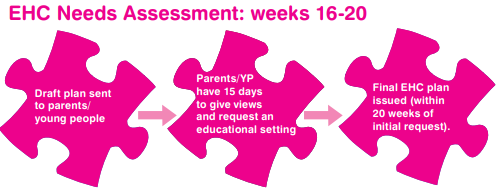
How long does the whole assessment process take?
The whole process should take no more than 20 weeks. View the 'EHC Assessment Process Timeline' below for a breakdown of what happens and when.
Timelines in Full
What if I do not agree with the Local Authority about the EHC Needs Assessment?
At any stage of the process you can talk to your Local Authority EHC Plan Co-ordinator. This person will be named in the letter you receive from the Local Authority to notify you that it has received a request for an EHC assessment.
The SEND Information, Advice and Support Service (SENDIASS) can give you impartial, confidential information and advice about the options open to you, discuss any concerns you may have and support you through the process.
The Local Authority must inform you of your right to appeal to the Special Educational Needs and Disability Tribunal Service (SENDIST) and the requirement for you to consider mediation should you wish to appeal.
The Local Authority will state this in its letter to you at the following stages:
1. If the Local Authority refuse to make an EHC assessment of your child or young person’s special educational needs
2. If the Local Authority refuse to issue a draft EHC Plan following the assessment
You can find out more information about resolving disagreements in Chapter 11 of the Code of Practice. www.gov.uk/government/publications/send-code-of-practice-0-to-25 or in our sections on Resolving Disagreements.
Other sources of EHC information
- IPSEA have produced an EHC plan checklist that sets out what legally must be included as a minimum in any EHC plan issued by a Local Authority.
- You may find the Special Educational Needs and Disability Code of Practice : A Guide for Parents and Carers a useful source of information. Chapter 9 focusses on the Education Health and Care Needs Assessments and Plans.
Personal Budgets
You are entitled to request a Personal Budget if your child has an EHC plan or has been assessed as needing a plan. A Personal Budget is an amount of money your Local Authority has identified to meet some of the needs in your child's EHC plan, if you want to be involved in choosing and arranging a part of the provision to meet your child's needs. You (or your representative) will need to agree this with your Local Authority. A Personal Budget can only be used for agreed provision in the EHC plan.
The Special Educational Needs Jungle also provides information on Personal Budgets which you may find useful.
Transport
The Department for Education has produced Home to School Travel and Transport Guidance. This guidance will help parents/schools/professionals understand the Local Authorities duty to have regard to the policy when carrying out their duties in relation to home to school travel and transport, and sustainable travel.
Coventry Local Authority's transport policy must be published as part of its Local Offer.
There is a separate document for post-16 transport to education and training.
